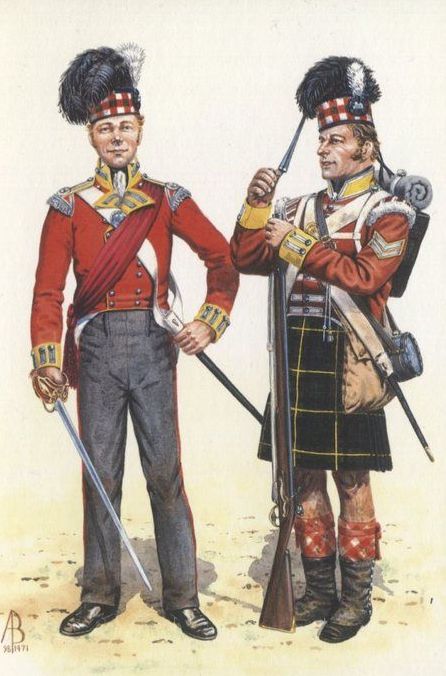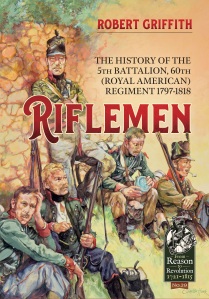
With publication of my history of the 5th Battalion of the 60th, Riflemen, now imminent I have moved on to researching my next project which will cover the actions at Arroyomolinos and Almaraz. Inevitably, I have come across a few mentions of the 5/60th that I wish I had found sooner.
I found one such episode in a history of the 92nd (Gordon Highlanders) Regiment. In 1812 Major General Howard’s brigade was advancing to cover Wellington’s siege at Badajoz:
Medellin was occupied without opposition, and General Howard was informed that the enemy had also retired from Don Benito; he, however, sent Captain Blacier [sic] with his riflemen to make sure. The captain was a gallant soldier, but fond of good living, and was making his way through the streets thinking more of the good dinner he expected to find there than of the enemy, when, on turning a corner, to their mutual astonishment, he found himself close to a French cavalry patrol, who had entered the town unconscious that the British were so near. First they gazed at each other, and then proceeded to settle right of way by sabre cuts and rifle bullets; the latter had the best of it, and the dragoons wheeled to the right-about, leaving some wounded men in the hands of the German riflemen.
C.G. Gardyne – The Life of a Regiment – The History of the Gordon Highlanders, Vol. 1, Published 1901.
It is an interesting passage that illustrates how the 5/60th were used, but I found the description of Captain Peter Blassier as liking good living a little at odds with the another more austere description I had, so I wondered what the source of the passage was.
I found the original in a memoir written by James Hope, an officer of the 92nd, Gordon Highanders:
Medellin was occupied about sunset without opposition. Informed that the enemy had retired from Don Beneto, General Howard, on arriving close to the village, dispatched Captain Blacier [sic] with his rifles into the town, to see that none of the enemy lurked in it, and to obtain an interview with the chief magistrate regarding quarters. The gallant Captain was plodding his way through the streets, thinking on the good things of this world, when all at once his thoughts were rivetted on the things of the world to come. Unconscious of their contiguity to the British, a French cavalry patrol had entered the village on a reconnoitring excursion, and like my friend the Captain, were thinking of every thing but what was before them. Each party was therefore moving along in conscious security, when, on turning the corner of a street, they unexpectedly met. With eyes looking in amazement, they gazed at each other for a few moments, and then proceeded in the usual manner to extricate themselves from the dilemma into which false intelligence had led both parties. A pretty little skirmish ensued, in which the balls of the rifles made a suitable return for the favours showered upon their heads by the Gallic sabres. After a few mortal wounds had been given and received, the enemy, suspecting they had got into the wrong-box, wheeled to the right-about, retired rather precipitately, and left the gallant Captain in possession of the well-won honours of the street.
J. Hope, The Military Memoirs of an Infantry Officer 1809-1816, published 1833.
The passage has much more detail, but I still thought the description of Blassiere as ‘plodding’ and distracted a touch strange for an experienced officer in potentially hostile territory. So, I went back to a collection of letters Hope had published before writing his memoir:
The left column, consisting of the 92d regiment, a few cavalry, and two pieces of artillery, took possession of Medellin without opposition. The right column, consisting of the remainder of the cavalry and artillery, with the 50th and 71st regiments, arrived in the vicinity of Don Benito about sunset. Captain Blacier, commanding the rifle company attached to this brigade, was sent with his men into the town to see if all was quiet, and to bring out the alcalde [mayor], to provide accommodation for the troops. Capt. Blacier [sic] had proceeded a little way down the second street he had come to, when he was attacked by a party of French cavalry, sword in hand. A sharp brush took place, but it was soon ended, by the enemy making the best of their way out of the town, with the loss of a few men wounded. Some of the rifle company received severe sabre cuts about their heads and arms.
J. Hope, Letters from Portugal, Spain and France, published 1819
The letters were published seven years after the events described, and you would hope were reasonably accurate copies of what was written at the time. The memoir was published 21 years after the events. It could, of course, have been written earlier. Hope may have recalled extra details when writing the memoir, but he could not question Blassiere as to his state of mind because he had died of wounds in 1814. It is also more than likely that Hope decided to embellish the tale a little, and then that in turn got reinterpreted by Gardyne, which ended up radically changing the impression a reader might get of Blassiere.
As I am still fairly new to writing history such cases of small embellishments or generalisations that get amplified, serve as salutary lessons on tracing sources back as far as you can go and never taking oft repeated facts at face value.

My history of the 5/60th – Riflemen is available now from Amazon.com, Amazon.co.uk and other book retailers, or direct from the publisher Helion & Co.
